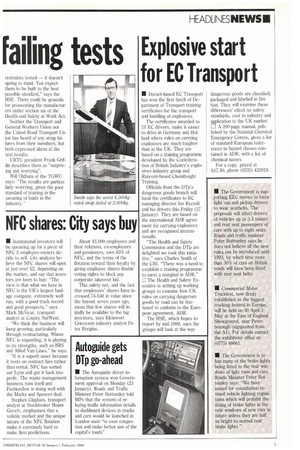Explosive start for EC Transport
Page 7

If you've noticed an error in this article please click here to report it so we can fix it.
• Dorset-based EC Transport has won the first batch of Department of Transport training certificates for the transport and handling of explosives.
The certificates awarded to 21 EC drivers, make it easier to drive in Germany and Holland where rules on carrying explosives are much tougher than in the UK. They'are based on a training programme developed by the Confederation of British Industry's explosives industry group and Runcorn-based Chemfreight Training.
Officials from the DTp's dangerous goods branch will hand the certificates to EC managing director Ian Rycroft and his drivers this Friday (27 January). They are based on the international ADR agreement for carrying explosives and are recognised internationally.
-The Health and Safety Commission and the Dip are delighted we took this initiative," says Charles Smith of the CBI. "'l'here was a need to establish a training programme to meet a marginal in ADR." 12 The Health and Safety Executive is setting up working groups to examine how UK rules on carrying dangerous goods by road can be tinetuned to conform to the European agreement, ADR.
The HSE, which hopes to report by mid-1989, says the groups will look at the way
dangerous goods are classified, packaged and labelled in Britian. They will examine these differences' effect on safety standards, cost to industry and application to the UK market. LI A 200-page manual, published by the National Chemical Emergency Centre, gives a list of standard European references to hazard classes contained in ADR, with a list of chemical names.
For a copy, priced at 247.50, phone (0235) 432919.








































































































































